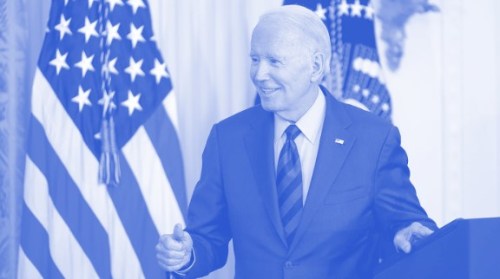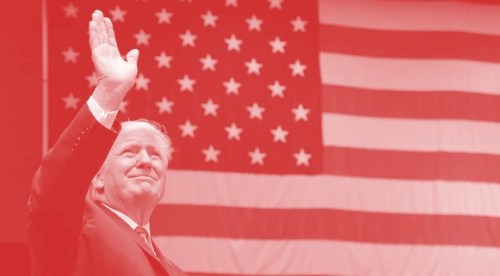Winners and losers from Super Tuesday
Tuesday was the biggest day yet in the fight for the presidential nomination of each major party — at least in terms of total votes cast.
Fifteen states held Republican or Democratic contests Tuesday, and there were also Democratic caucuses in American Samoa.
Excitement about the overall outcome was in short supply given that President Biden faced only token opposition and former President Trump was in no danger from his sole remaining rival, former United Nations Ambassador Nikki Haley.
Biden and Trump duly won sweeping victories.
The more interesting elements of Super Tuesday lay beneath the surface of the presidential race — and in some of the other primaries for Senate and House races.
Here are the winners and losers.
Winners
Former President Trump
The GOP race is over, even if Trump has not yet officially clinched the nomination.
With the sole exception of Vermont, Trump won thumping victories everywhere Tuesday.
In Virginia, where the Haley campaign had held out some thin hope of an upset, Trump won by about 30 points.
He is set for even bigger victories in the two most populous states of the day, California and Texas.
Trump’s emphatic victory in this year’s primary process is a remarkable comeback for a candidate whose political career seemed to be over in the wake of the Capitol riot of Jan. 6, 2021.
But that shadow still looms over Trump, not least in the shape of some of the 91 criminal charges he faces.
There were also some warning signs for Trump in his weakness in more moderate and affluent areas — the northern suburbs of Virginia, for example.
For all that, the bottom line is that the GOP is Trump’s party now.
President Biden
Yes, Biden is an incumbent president with only nominal opposition.
But there is nothing else he can do in that scenario but win by huge margins — which he did everywhere, barring tiny American Samoa. The territory’s caucuses were won by a near-unknown, Jason Palmer, who pulled in a grand total of 51 votes.
In actual states, no named candidate other than Biden looks likely to reach double digits.
The president, who believes himself to be often underestimated, is on a glide path to the nomination.
For Biden, like Trump, there are warning signs, though — specifically, continued dissent over his support for Israel in its assault on Gaza.
Pro-Palestinian Democrats
The most striking result from a Democratic contest — excluding American Samoa — came in Minnesota. And it was bad news for Biden.
A campaign to vote “uncommitted”, driven by pro-Palestinian dissenters unhappy with Biden’s policy on Israel and Gaza, drew almost 20 percent of the vote.
Organizers of the effort noted that they had campaigned for just one week and spent a paltry $20,000.
The result outstripped the one achieved in Michigan last week, where 13 percent of Democratic primary voters chose “uncommitted.”
Biden’s defenders will argue he is trying to thread a difficult needle, given how sharply the conflict between Israel and the Palestinians divides his party.
They will also hope a cease-fire happens soon, perhaps binding up some political wounds.
But there are real dangers for Biden now on vivid display.
Rep. Adam Schiff (D-Calif.)
Schiff emerged from Super Tuesday as a strong favorite to take a Senate seat come November.
The congressman easily advanced in California’s all-party “jungle primary,” but the crucial win for Schiff is that his opponent in the general election will be former baseball star Steve Garvey, a Republican.
Schiff, who had a strong fundraising advantage, is estimated to have spent about $10 million in ads that lifted Garvey’s profile.
That, in turn, appears to have thrown up a roadblock against the ambitions of other Democratic candidates, the most prominent being Rep. Katie Porter (D-Calif.).
In the Golden State’s primary system, the top two candidates regardless of party advance to the general election. Schiff would fancy his chances more against Garvey than Porter in the deep-blue state.
It’s always possible that Garvey, best known for his time with the Los Angeles Dodgers, could pull a big surprise in November.
But no Republican has won statewide in California since 2006.
American Samoa
The tiny territory made its voice heard to an outsize degree for the second election cycle in a row.
While Palmer’s victory was a major shock, it bears emphasizing just how small the electorate is.
Palmer’s 51 voters didn’t even match the result four years ago, when former New York City Mayor Michael Bloomberg won an equally surprising victory in the Democratic caucuses with 175 votes.
Losers
Nikki Haley
Haley at least won one of the 15 GOP contests, taking victory in the Vermont primary.
But a win in one of the most liberal states in the nation was never going to change the course of a GOP primary. By 1 a.m. EST, Haley had accrued just 19 delegates Tuesday, while Trump had added almost 500.
For the former South Carolina governor, this was the night when any lingering flame of hope was snuffed out.
Haley conspicuously made no public remarks at all. Her campaign aides said she was in her home state of South Carolina. A suspension of her campaign must likely come soon.
Despite her defeat in the primary battle, Haley has grown in stature within the party, easily supplanting Florida Gov. Ron DeSantis as Trump’s main rival.
She has advanced a very different vision of the GOP from Trump and, if he should lose in November, she can certainly say, “I told you so.”
Haley is only 52, so could easily run again in 2028, or beyond.
But for 2024, this is surely the end of the road.
Iowa Democrats
The Iowa Democratic caucuses have a storied history — and now, it’s pretty much over.
During Iowa’s time as the first-in-the-nation contest, it played host to hugely dramatic moments, perhaps the most notable being then-Sen. Barack Obama’s (D-Ill.) 2008 victory.
But four years ago, the Democratic caucuses were a debacle, with organizational chaos meaning there was no result on the night.
The embarrassment — and the more important imperative among Democrats to make the first states more representative of the nation as a whole — means that Iowa’s results are now part of Super Tuesday.
Biden won, with roughly 91 percent of the vote.
It created no ripples at all.
Excitement for the American public
As a contest, this year’s Super Tuesday was a snooze.
The overall outcome was in no doubt at all — and the wins for Haley in Vermont and the hitherto-unknown Palmer in American Samoa did nothing to change the broader contours.
This, in turn, underlines the main paradox of this year’s race.
Biden and Trump are going to secure their party nominations with ease, yet polls indicate millions of Americans look at that prospect of a 2020 rematch with grim resignation.
Back in January, a Reuters/Ipsos poll indicated that 67 percent of Americans were “tired of seeing the same candidates in presidential elections and want someone new.”
Theoretically, that should open up ground for a third-party candidacy.
Whether anyone will be able to truly capitalize is a different question.
Robert F. Kennedy Jr. announced on Super Tuesday that he had now secured enough signatures to get on the ballot in Nevada.
Kennedy is polling at 11 percent in a hypothetical match-up with Biden and Trump, according to the average maintained by The Hill and Decision Desk HQ.
Copyright 2023 Nexstar Media Inc. All rights reserved. This material may not be published, broadcast, rewritten, or redistributed.





